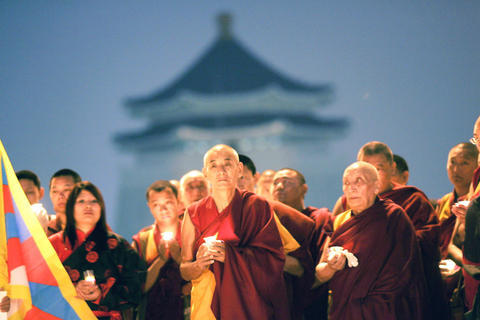Tibet's governor denounced anti-Chinese protesters in Lhasa as criminals and vowed to bring them to justice as a midnight deadline loomed yesterday for them to turn themselves in. More clashes erupted in other Chinese provinces.
Champa Phuntsok, an ethnic Tibetan, said the death toll from last week's violent demonstrations in the Tibetan capital had risen to 16 and dozens were injured.
The Dalai Lama's exiled Tibetan government in India has said that 80 Tibetans were killed -- a claim Champa Phuntsok denied.

PHOTO: DAVID LONGSTREATH, AP
The governor steered a line between sounding reassuring and being tough at his press conference in Beijing. He told reporters security forces "did not carry or use any lethal weapons," but promised that authorities would deal harshly with rioters who defy the surrender notice.
"No country would allow those offenders or criminals to escape the arm of justice and China is no exception," he said.
"If these people turn themselves in, they will be treated with leniency within the framework of the law," he said.
Otherwise, "we will deal with them harshly," he said.
Champa Phuntsok described a scene of chaos throughout Lhasa on Friday with "people engaged in reckless beating, smashing, looting and burning."
Shops, schools, hospitals and banks were targeted and bystanders were beaten and set on fire, he said.
Among the 16 dead, he said, three people jumped out of buildings to avoid arrest while 13 were "innocent civilians."
In one case, a person died after being covered in gasoline and then set on fire, he said. In another incident, the protesters "knocked out a police officer on patrol and then they used a knife to cut a piece of flesh from his buttocks the size of a fist," he said.
He said calm had been restored.
Authorities paraded handcuffed Tibetan prisoners in Lhasa yesterday, the Times of London reported in its online edition. The report said four trucks in a convoy drove through the city with 40 people, mostly young Tibetan men and women, standing in the back, their wrists handcuffed and a soldier behind each one holding the prisoner's head bowed.
Going house-to-house, police checked identity cards and residence permits, detaining anyone without permission to stay in Lhasa, the Times said.
The Washington-based International Campaign for Tibet said residents feared a military sweep after the midnight deadline.
US Secretary of State Condoleezza Rice called again yesterday for China to exercise restraint and said Beijing should find a way to engage the Dalai Lama. But Russia said it hopes China's government "will take all necessary measures to stop illegal actions and provide for the swiftest possible normalization of the situation."
Security forces were also mobilizing across western China's mountain valleys and broad plains to deal with sympathy protests in Tibetan communities in the provinces of Gansu, Sichuan and Qinghai.
Officials expelled foreign reporters from Tibetan areas in Qinghai and Gansu provinces yesterday, while police in Lhasa kicked out reporters from three Hong Kong TV stations -- Cable TV, TVB and ATV -- and made TVB delete footage of Friday's violence, TVB reported.

Rainfall is expected to become more widespread and persistent across central and southern Taiwan over the next few days, with the effects of the weather patterns becoming most prominent between last night and tomorrow, the Central Weather Administration (CWA) said yesterday. Independent meteorologist Daniel Wu (吳德榮) said that based on the latest forecast models of the combination of a low-pressure system and southwesterly winds, rainfall and flooding are expected to continue in central and southern Taiwan from today to Sunday. The CWA also warned of flash floods, thunder and lightning, and strong gusts in these areas, as well as landslides and fallen

WAITING GAME: The US has so far only offered a ‘best rate tariff,’ which officials assume is about 15 percent, the same as Japan, a person familiar with the matter said Taiwan and the US have completed “technical consultations” regarding tariffs and a finalized rate is expected to be released soon, Executive Yuan spokeswoman Michelle Lee (李慧芝) told a news conference yesterday, as a 90-day pause on US President Donald Trump’s “reciprocal” tariffs is set to expire today. The two countries have reached a “certain degree of consensus” on issues such as tariffs, nontariff trade barriers, trade facilitation, supply chain resilience and economic security, Lee said. They also discussed opportunities for cooperation, investment and procurement, she said. A joint statement is still being negotiated and would be released once the US government has made

SOUTH CHINA SEA? The Philippine president spoke of adding more classrooms and power plants, while skipping tensions with China over disputed areas Philippine President Ferdinand Marcos Jr yesterday blasted “useless and crumbling” flood control projects in a state of the nation address that focused on domestic issues after a months-long feud with his vice president. Addressing a joint session of congress after days of rain that left at least 31 dead, Marcos repeated his recent warning that the nation faced a climate change-driven “new normal,” while pledging to investigate publicly funded projects that had failed. “Let’s not pretend, the people know that these projects can breed corruption. Kickbacks ... for the boys,” he said, citing houses that were “swept away” by the floods. “Someone has

‘CRUDE’: The potential countermeasure is in response to South Africa renaming Taiwan’s representative offices and the insistence that it move out of Pretoria Taiwan is considering banning exports of semiconductors to South Africa after the latter unilaterally downgraded and changed the names of Taiwan’s two representative offices, the Ministry of Foreign Affairs (MOFA) said yesterday. On Monday last week, the South African Department of International Relations and Cooperation unilaterally released a statement saying that, as of April 1, the Taipei Liaison Offices in Pretoria and Cape Town had been renamed the “Taipei Commercial Office in Johannesburg” and the “Taipei Commercial Office in Cape Town.” Citing UN General Assembly Resolution 2758, it said that South Africa “recognizes the People’s Republic of China (PRC) as the sole